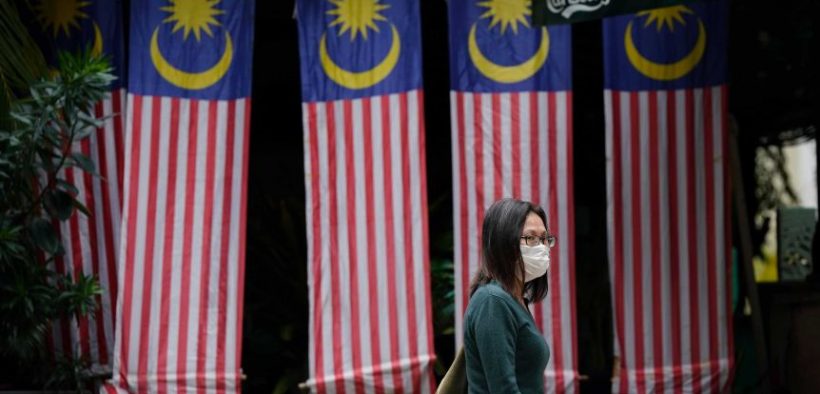Malaysia stares down health, political crises as Anwar Ibrahim strikes back

Malaysia, which has a larger population than Australia, has to date recorded around a third of the coronavirus cases.(AP: Vincent Thian)
Malaysian politics again finds itself in crisis as the country faces a worrying resurgence of coronavirus infections.
Key points:
Most of Malaysia’s ministers are self-isolating after the Religious Affairs Minister tested positive for coronavirus
Anwar Ibrahim’s appointment as PM would require the approval of the King, who fell ill as the opposition leader said he had a parliamentary majority
Observers fear Malaysia is returning to political repression of the “bad old days”, accelerated by the pandemic
The country recorded its largest number of new COVID-19 cases to date on Monday with 432 — only three of which were imported.
Religious Affairs Minister Zulkifli Mohamad Al-Bakri announced he had tested positive for COVID-19.
Prime Minister Muhyiddin Yassin and much of his Cabinet have entered self-quarantine for 14 days as a precaution, having come in contact with Mr Zulkifli.
“I will continue to work from home and use video conferencing for meetings I need to organise,” Mr Muhyiddin said in a statement.
It is no time for rest.
Long-time opposition figure Anwar Ibrahim said late last month he had majority support in Malaysia’s Parliament and thus should replace Mr Muhyiddin as Prime Minister.
Malaysia’s opposition leader Anwar Ibrahim smiles and gestures as he leaves a press conference.
Mr Anwar is a divisive figure in Malaysian politics who was jailed under two prime ministers in politically-charged cases.(AP: Vincent Thian)
“We have a strong, formidable majority … [which] means that the administration of Muhyiddin has fallen,” he said.
Taking the top job requires the blessing of Malaysia’s King, Sultan Abdullah Sultan Ahmad Shah, who cancelled his appointment with Mr Anwar due to hospitalisation for food poisoning.
When Prime Minister Muhyiddin took power in February after claiming a parliamentary majority, the King interviewed all 221 members of Parliament to confirm his support, sparking speculation about the true cause of his hospitalisation last week.
For the latest news on the COVID-19 pandemic read our coronavirus live blog.
“I get the sense that not everyone in UMNO or some of the other parties are with Anwar Ibrahim on this,” Ibrahim Suffian, an analyst from Malaysian pollster the Merdeka Centre, told the ABC.
UMNO, the United Malays National Organisation, ruled Malaysia for decades until 2018, and remains a formidable force in the country’s politics.
As an UMNO deputy prime minister under the then-government of Mahathir Mohamad, Mr Anwar was on the cusp of taking the top job but was jailed in 1998 for what were widely considered trumped up charges of corruption and sodomy.
“Anwar has not displayed or mentioned who those individuals are supporting him. Presumably he wants to keep them on his side until he gets an audience with the King,” the Merdeka Centre’s Mr Ibrahim said of the current situation.
Malaysian Prime Minister Muhyiddin Yassin makes a speech alongside two Malaysian flags.
Muhyiddin Yassin replaced Mahathir Mohamad as Prime Minister in February this year.(AP: UNTV)
“It’s a game of wait and see whether or not Anwar Ibrahim really has the number of MPs that he claims to have.”
Mr Muhyiddin maintains he is the rightful Prime Minister until proven otherwise.
The outcome of recent elections in the eastern state of Sabah on Borneo — in which parties on Mr Muhyiddin’s side came out on top — have cast further doubt on Mr Anwar’s claim.
COVID-19 relatively stable, even in year of political disarray
Malaysia, which has a population slightly larger than Australia’s, enforced strict lockdowns early on in the pandemic.
As a result, it managed to go from South-East Asia’s coronavirus epicentre to a COVID success story in the region.

Recorded cases of COVID-19 to date have numbered less than 13,000 — around a third of Australia’s total — and just 137 deaths.
This is even despite the fact that Malaysia briefly went without a health minister as Mahathir Mohamad’s government was replaced by that of Mr Muhyiddin in February.
“These are two different matters: party politics is one thing, pandemic control is another thing,” said Sin Yee Koh, a senior lecturer in global studies at Monash University Malaysia.
“The latter is a situation that can be controlled using scientific methods like tests, contact tracing, travel restrictions, healthcare and consistent communication — repeat emphasis on safety measures and personal hygiene, and standard operating procedures.

But the Sabah elections appear to have caused a significant spike in cases.
Malaysia’s director-general of Health, Noor Hisham Abdullah, has warned of the “beginning of a new wave”.
Emboldened by the Sabah election results, the national Government could announce a snap election in 2020 — a prospect Mr Mahathir has warned against.
“I am confident that if the general election is held now, many people will be affected by COVID-19, many will die,” he said as quoted by state-run news agency Bernama.











